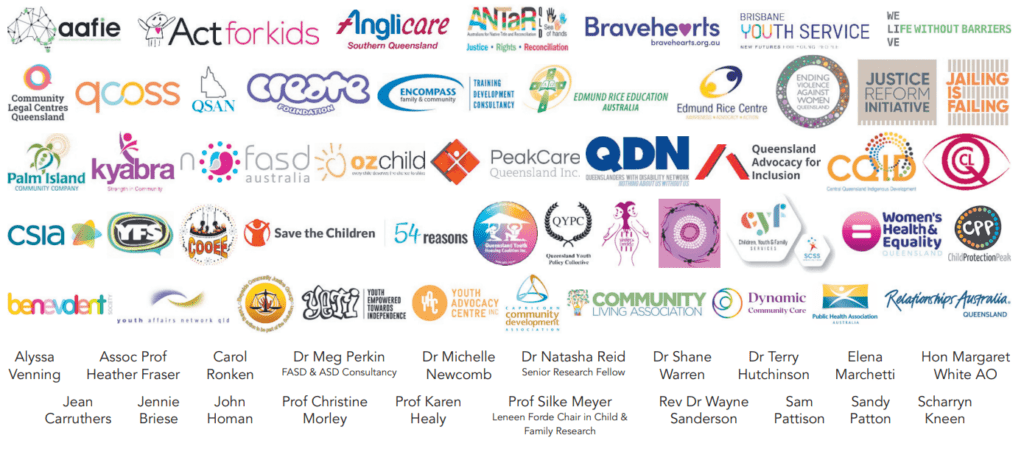Stop youth crime – get smarter, not tougher
Organised by Peak Care Queensland, individuals and organisations across Queensland compiled the below open letter to the Queensland Parliament that was published in the Courier Mail on the 28th January 2023.
Our open letter to the Queensland Parliament
STOP YOUTH CRIME – GET SMARTER NOT TOUGHER
We are organisations and individuals concerned about preventing youth crime, reducing re-offending and achieving community safety. As you deliberate about youth crime, we respectfully urge you to consider the following:
STOP POLITICISING YOUTH CRIME
Queensland communities deserve evidence-based solutions to youth crime that actually work. They do not deserve political point-scoring about who is the toughest on crime.
A bi-partisan approach based on getting smarter, not tougher, will produce better outcomes for everyone in keeping communities safe.
TAKE NOTICE OF THE FACTS
Queensland already has some of the toughest laws and the highest number of children imprisoned in Australia. Despite decreasing youth crime rates, the number of children held in Queensland detention centres continues to increase.
In 2021-22, with detention centres overflowing, around 470 Queensland children – some as young as 10 – were held in adult watchhouses for periods of up to 14 days. A watchhouse is not a fit place for a child.
Locking children up does not free communities from crime. There is overwhelming evidence that youth detention does not work to deter crime, rehabilitate, or make communities safer. In fact, the experience of being incarcerated increases the likelihood of children offending. Almost all children who are imprisoned in youth detention in Queensland reoffend within 12 months of their release.
We can never imprison our way to a safer community, but there is plenty of evidence about how we can reduce crime.
PROTECT OUR CHILDREN – MORE THAN ANY OTHER AGE GROUP, THEY ARE THE VICTIMS OF CRIME
While we are all concerned about children who break the law, please remain aware that children, more than any other age group, constitute the majority of crime victims. Many of the children who find themselves on the wrong side of the law have been the victims of crimes far more serious than any offences they have committed.
Many have grown up learning that adults are not to be trusted. Is it any wonder that they have little respect or trust in authority figures and the justice system? It takes time, persistence and skills to regain the trust of these children.
LET FIRST NATIONS LEADERS LEAD
The gross over-representation of Aboriginal and Torres Strait Islander children in detention -over 70% – continues to draw shame on the world stage. When First Nations leaders and organisations have been able to design and manage responses to youth crime within their communities, the results have been impressive.
Governments need to get out of the way and let First Nations leaders lead. This means making a genuine commitment to self-determination by First Nations peoples and resourcing of their communities to deliver local responses that they, more than anyone else, know will work best.
PROPERLY RESOURCE OUR TEACHERS AND SCHOOLS
By the time children enter detention, over 50% have not been attending school. It is within the classroom that anti-social behaviours usually begin to emerge. Non-attendance at schools and high rates of suspensions and exclusions are frequent precursors to children’s involvement with the youth justice system.
Better resourcing of teachers and schools with the programs and supports they need to keep children engaged in schooling will help stop problems before they start.
TAKE ACCOUNT OF CHILDREN’S DISABILITIES AND MENTAL HEALTH CONERNS
Many children in the youth justice system have severe disabilities, including fetal alcohol spectrum syndrome disorder. There are no systematic screening or assessment processes in place to identify disabilities of children involved with Queensland’s youth justice system, meaning we are currently detaining children with undiagnosed disabilities and providing no appropriate supports when children leave detention – a recipe for reoffending. Failure to consider neurodisabilities and mental health concerns of children encountering the youth justice system mean all current solutions are doomed to fail.
TACKLE OUR SOCIAL PROBLEMS
Research by the Queensland Family and Child Commission and others has found that most children in detention have experienced violence within their homes, poverty, homelessness or the absence of a safe place to call home, and/or exposure to alcohol and other substance misuse.
We must address these issues by tackling child poverty, collectively ending youth homelessness, addressing the impact of family violence on children, and increasing the number and range of specialised youth mental health services, alcohol and drug treatment services, child protection, family support, early education and mentoring programs.
Ban social media outlets from posting both children’s illegal exploits and ‘hate messages’ from vigilante groups – both are inciting children to commit offences.
Get tougher on the causes of youth crime – it will represent a far better, less costly and more effective investment of taxpayers’ dollars in achieving community safety.
HOLD CHILDREN ACCOUNTABLE FOR THEIR BEHAVIOURS IN WAYS THAT WORK
Threats of harsher punishments do not deter children from offending. The incarceration of children is the single biggest predictor of children entering into a lifetime of crime.
Why is it that there has been a significant reduction in the use of restorative justice approaches in recent times? In many instances, restorative justice very effectively brings children and the victims together face-to-face to help children understand and take responsibility for their behaviour and work out the ways they can repair the harm. It is just one example of getting smarter, rather than tougher, in using solutions that work. There are many more.
DIVERT CHILDREN UNDER THE AGE OF 14 FROM THE CRIMINAL JUSTICE SYSTEM
The younger children are when they first have contact with the justice system, the more likely they are to go on to re-offend. Effective responses involve children quickly discovering the consequences of bad behaviour, whilst also providing guidance to not repeat their mistakes. Children, especially very young children, do not understand or benefit from fronting courts and waiting months while the wheels of justice slowly turn. There are much more effective ways of holding children to account in ways that are timely and well-matched to a child’s age and stage of development.
Any evidence-based policy to keep the community safe should include significant investment in strategies that work to divert children, especially those younger than 14, from the criminal justice system.
Collectively, we remain firmly committed to working with members of the Queensland Parliament on strategies to reduce youth crime. We are especially committed to working on strategies that are smarter, not tougher, in protecting Queensland communities and keeping them safe.
The figures referred to within this letter have been drawn from the Children’s Court of Queensland Annual Report 2021-22.
Please refer to the ‘Orange Paper #2 – a ten-point evidence-based plan for investment to address youth offending’ first published by the Youth Advocacy Centre in 2020 – it provides a good starting point for getting smarter, not tougher.

